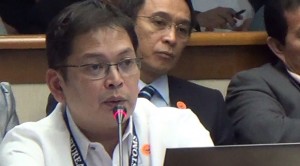Not enough men, computers to do our job, Customs chief laments
MANILA, Philippines—Customs Commissioner John Phillip Sevilla said the port collection agency did not have enough people or computers to do its job properly but he hoped to solve this problem by mid next year.
Speaking before a recent meeting with traders and other customs stakeholders at the Development Bank of the Philippines in Makati City, the former finance undersecretary said the agency’s 3,600-plus personnel nationwide, using only 994 computers with limited Internet connections, were “not enough to do the job” of handling the country’s imports and raising the much-needed government revenues in the process.
Worse, despite their “great responsibility and high degree of accountability,” they “get a poor salary compared to their counterparts” in other government agencies, he noted.
Credibility problem
However, he acknowledged the agency had a “problem of credibility.”
Article continues after this advertisementVarious surveys have ranked the agency as among the most corrupt government offices.
Article continues after this advertisement“Let us show good performance first. We need to show that we’re meeting our targets. We have to show that we can do it,” he told BOC employees.
For the fourth consecutive month this year, the Bureau of Customs (BOC) failed to meet its revenue goal, with April collections coming up to P30.76 billion, about P5.03 billion short of its P35.79-billion target for the 19-day period.
Last month’s revenues brought to P117.26 billion the agency’s collections from January to April, about P13.31 billion short of its P130.57-billion goal for the period.
The bureau’s annual collection target is P408.1 billion.
Hiring more people
During the Makati forum, Sevilla pushed for the “hiring of more people.” He also stressed the need to “sort out a reasonable and appropriate way to pay for overtime of customs people on a regular basis.”
But he announced some good news: “In September, everyone who needs a computer will have one and will no longer have to share. Also in September, all customs offices in Manila will have the best Internet access. By December, all our ports will have Internet access because information technology is key to where we want to be a few months from now,” he said.
He expressed confidence that by June next year, the bureau would be able to “offer the public a fully electronic and paperless processing of customs transactions.”
The BOC “is presently designing the IT infrastructure and building the platform to be able to do everything digitally,” he said.
Reform program
Last month, he reported that the agency’s reform program, initiated in October, had been “moving forward” with projects like ports rationalization, better coordination between the BOC and the Bureau of Internal Revenue, adoption of best international customs practices, implementation of the agency’s international commitments, and updating the outdated Tariff and Customs Code of the Philippines, among others.
The project stressed the need to “uproot corruption by rebooting customs.”
Sevilla noted that “a long history of backroom deals, institutionalized theft and impunity have made the bureau one of the most prominent faces of corruption in government.”
Drastic shifts
However, he claimed this was “beginning to change with drastic shifts in leadership, personnel and processes already taking place.”
The Bureau of Customs was among the agencies criticized by President Aquino in his State of the Nation Address last July.
“Where do these people get the gall?” he asked, referring to BOC officials and employees allegedly involved in smuggling and other illegal activities.
